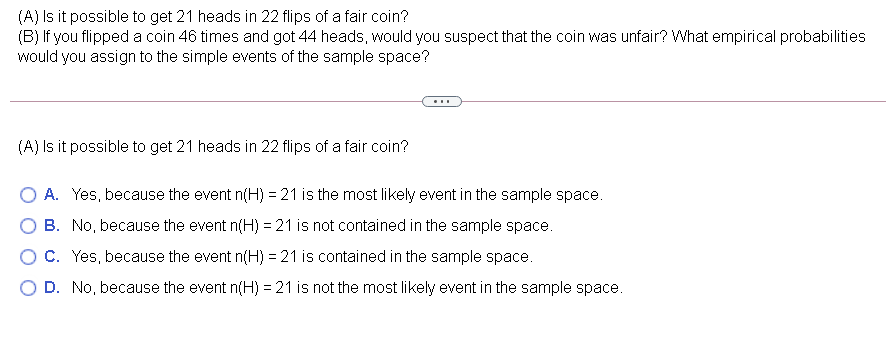(A) Is it possible to get 21 heads in 22 flips of a fair coin? (B) lf you flipped a coin 46 times and got 44 heads, would you suspect that the coin was unfair? What empirical probabilities would you assign to the simple events of the sample space? (A) Is it possible to get 21 heads in 22 flips of a fair coin? O A. Yes, because the event n(H) = 21 is the most likely event in the sample space. O B. No, because the event n(H) = 21 is not contained in the sample space. OC. Yes, because the event n(H) =21 is contained in the sample space. O D. No, because the event n(H) = 21 is not the most likely event in the sample space.
(A) Is it possible to get 21 heads in 22 flips of a fair coin? (B) lf you flipped a coin 46 times and got 44 heads, would you suspect that the coin was unfair? What empirical probabilities would you assign to the simple events of the sample space? (A) Is it possible to get 21 heads in 22 flips of a fair coin? O A. Yes, because the event n(H) = 21 is the most likely event in the sample space. O B. No, because the event n(H) = 21 is not contained in the sample space. OC. Yes, because the event n(H) =21 is contained in the sample space. O D. No, because the event n(H) = 21 is not the most likely event in the sample space.
Chapter8: Sequences, Series,and Probability
Section8.7: Probability
Problem 50E: Flexible Work Hours In a recent survey, people were asked whether they would prefer to work flexible...
Related questions
Question

Transcribed Image Text:(A) Is it possible to get 21 heads in 22 flips of a fair coin?
(B) If you flipped a coin 46 times and got 44 heads, would you suspect that the coin was unfair? What empirical probabilities
would you assign to the simple events of the sample space?
...
(A) Is it possible to get 21 heads in 22 flips of a fair coin?
A. Yes, because the event n(H) = 21 is the most likely event in the sample space.
B. No, because the event n(H) = 21 is not contained in the sample space.
C. Yes, because the event n(H) = 21 is contained in the sample space.
D. No, because the event n(H) = 21 is not the most likely event in the sample space.
Expert Solution
This question has been solved!
Explore an expertly crafted, step-by-step solution for a thorough understanding of key concepts.
Step by step
Solved in 2 steps with 2 images

Recommended textbooks for you


Holt Mcdougal Larson Pre-algebra: Student Edition…
Algebra
ISBN:
9780547587776
Author:
HOLT MCDOUGAL
Publisher:
HOLT MCDOUGAL


Holt Mcdougal Larson Pre-algebra: Student Edition…
Algebra
ISBN:
9780547587776
Author:
HOLT MCDOUGAL
Publisher:
HOLT MCDOUGAL